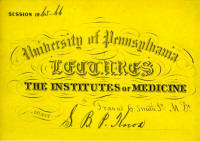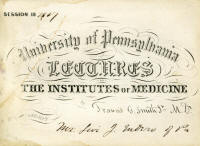Francis Gurney Smith, M.D.
Click image to enlarge
Smith, Francis Gurney (1818-1878)
Francis Gurney Smith, obstetrician and physiologist, was born in Philadelphia, March 8, 1818. His father, of the same name, a prosperous Philadelphia merchant, was one of six brothers, all of whom lived to be octogenarians and celebrated their golden weddings; his mother was Eliza Muckie; Francis was their fifth son. He graduated in arts at the University of Pennsylvania in 1837, taking an M. D. at the same institution, with the thesis "Delirium cum Tremore" in 1840; he studied medicine with his brother, Thomas M. K. Smith, of Brandywine, Delaware. In 1841 he became resident physician in the Pennsylvania Hospital for the Insane, but resigned in nine months to practice with his brother; he returned to Philadelphia, however, in 1842, to a practice, principally in obstetrics and diseases of women. The same year he was appointed lecturer on physiology by the Philadelphia Association for Medical Instruction; his private class, with J. M. Allen, numbered over one hundred students.
In 1852 he was elected to the chair of physiology in the Pennsylvania Medical College, retaining this position until 1863, when he succeeded Samuel Jackson (q. v.) as professor of the institutes of medicine at the University of Pennsylvania; failing health forced him to resign in 1877 when he was made emeritus professor.
With Francis West, John B. Biddle and John J. Reese, he was a member of the first medical staff of the Protestant Episcopal Hospital, named in the reports of 1853; from 1859 to 1864 he was on the medical staff of the Pennsylvania Hospital; from 1861 to 1863 he was medical director of the Christian Street Military Hospital, and left this post, under orders, to attend sick and wounded officers in the city.
Smith was the first president of the Philadelphia Obstetrical Society (1868-1872); in 1875 he founded the first physiological laboratory in the University of Pennsylvania.
He translated and added to Barth and Roger's "Manual of Auscultation and Percussion" (1849) ; he wrote with John Neill
"Handbook of Anatomy"; "Handbook of Chemistry"; edited three American editions of the fourth English edition of "Carpenter's Principles of Human Physiology," also the eighth English edition.
In 1856 Smith had Alexis St. Martin under observation, and published the result of his experiments in the Medical Examiner, of which he was editor, 1849-1856; this appeared also as "Experiments upon Digestion," 16 pages, Philadelphia, 1856.
In 1884 he married Catharine Madeleine, daughter of Edmund G. Dutilh, of Philadelphia; they had three sons and a daughter, the eldest son, Robert Meade, became a physician and physiologist. Francis Gurney Smith, Jr., as he was always called, was a vestryman of St. James Protestant Episcopal Church.
Renal calculi produced pyelitis; nervous symptoms succeeded; he went abroad twice, consulted physicians, but was unimproved. He died April 6, 1878, at his home in Philadelphia.

